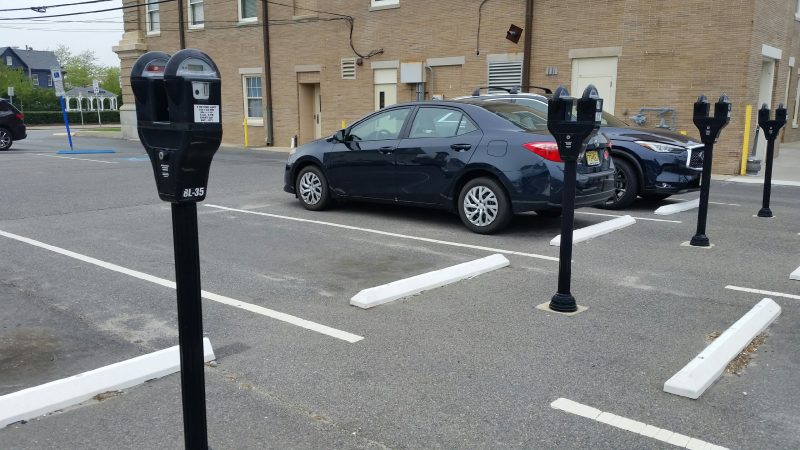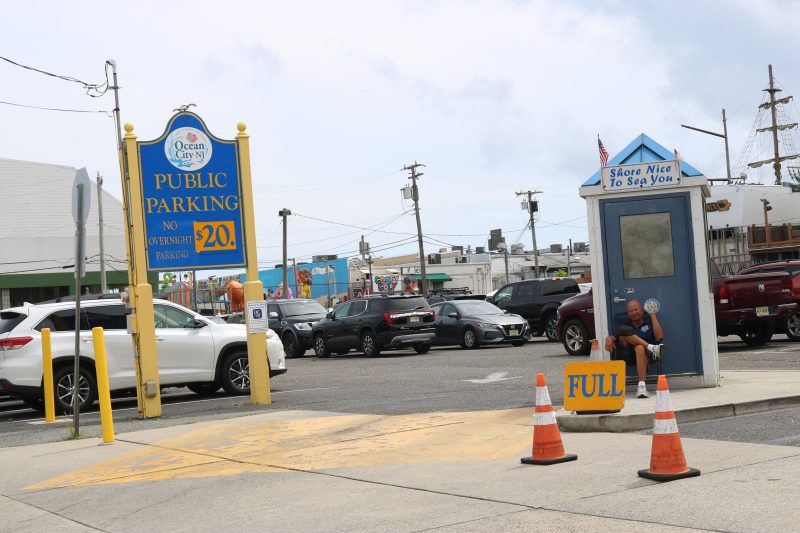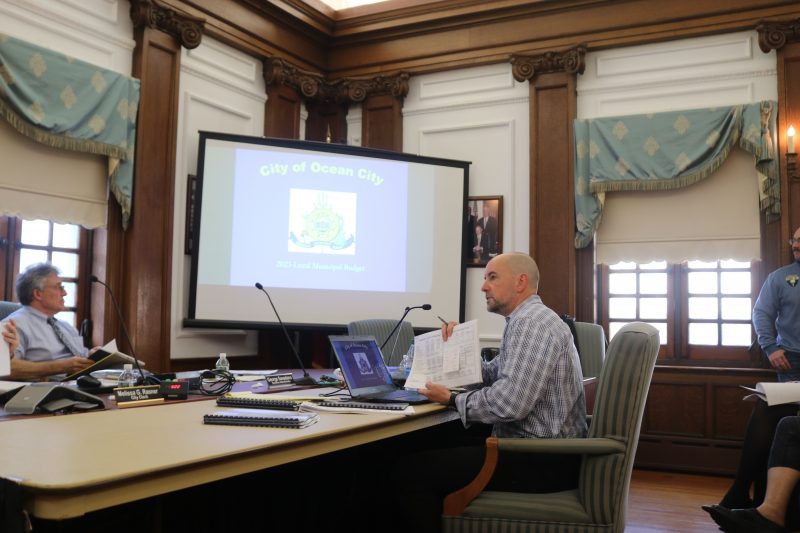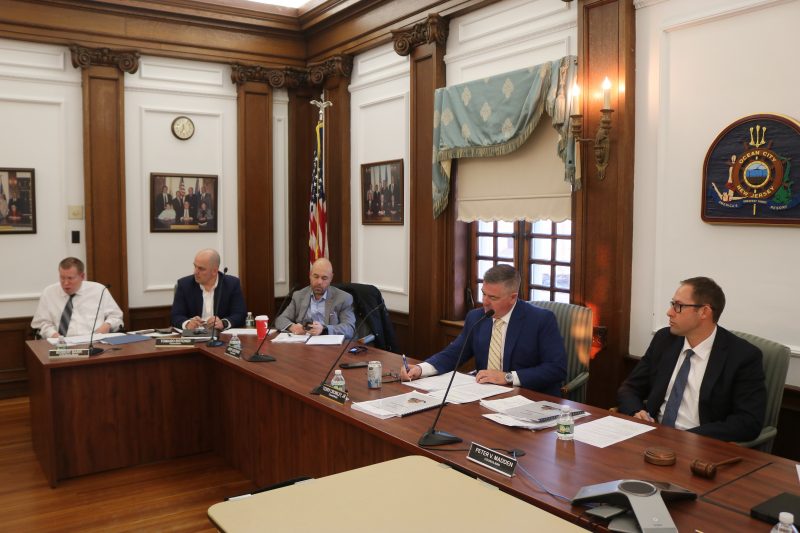Ocean City police officers stand in the back of the Council chambers in a show of unity in their contract negotiations with the city in March.
 By DONALD WITTKOWSKI
Parking fees would go up this summer as part of Ocean City’s proposed $98.9 million municipal budget unveiled Thursday night at a City Council meeting.
In a related development with the budget, about 40 police officers stood in the back of the Council chambers in a show of unity amid their contract negotiations with the city. The officers did not speak during the meeting and quietly filed out of the room after the budget presentation.
The 2023 budget proposed by Mayor Jay Gillian also includes a 1.77-cent increase in the local tax rate, which would add an extra $88.50 on the annual tax bill for a homeowner who has a house assessed at $500,000.
Creating more revenue for the budget, Council introduced an ordinance that will raise the parking charges for meters and surface lots.
At the parking lots, the city will now have the ability to charge up to $25 per day during peak times in the summer tourism season. Currently, the maximum daily parking fee is capped at $20 for the lots.
The city is also planning to raise the charge for parking meters in the Boardwalk and beach zones from $1.50 per hour to $2 per hour.
By DONALD WITTKOWSKI
Parking fees would go up this summer as part of Ocean City’s proposed $98.9 million municipal budget unveiled Thursday night at a City Council meeting.
In a related development with the budget, about 40 police officers stood in the back of the Council chambers in a show of unity amid their contract negotiations with the city. The officers did not speak during the meeting and quietly filed out of the room after the budget presentation.
The 2023 budget proposed by Mayor Jay Gillian also includes a 1.77-cent increase in the local tax rate, which would add an extra $88.50 on the annual tax bill for a homeowner who has a house assessed at $500,000.
Creating more revenue for the budget, Council introduced an ordinance that will raise the parking charges for meters and surface lots.
At the parking lots, the city will now have the ability to charge up to $25 per day during peak times in the summer tourism season. Currently, the maximum daily parking fee is capped at $20 for the lots.
The city is also planning to raise the charge for parking meters in the Boardwalk and beach zones from $1.50 per hour to $2 per hour.
 Meter parking would go up in the downtown, Boardwalk and beach zones.
Parking meters in the downtown zone will go from 25 cents per hour to 50 cents per hour. In addition, downtown parking meters will remain in operation year-round on the Asbury Avenue corridor between Sixth Street and 14th Street.
In years past, the downtown meters operated from May to October. Under the new plan, the downtown meters will be in operation from 9 a.m. to 9 p.m. from May to October and from 9 a.m. to 6 p.m. during the fall, winter and spring months.
The Downtown Merchants Association, a group representing business owners, proposed having the parking meters on Asbury Avenue stay on year-round. The city accepted the association’s proposal and incorporated it in the new ordinance for higher parking fees.
Danielle Guerriero, president of the Downtown Merchants Association, appeared at the Council meeting to speak in favor of having parking meters on Asbury Avenue in operation year-round.
Guerriero and city officials explained that the higher charge for the downtown meters will help create more parking spots for shoppers. As it stands now, the inexpensive downtown parking rates encourage retail workers, residents and non-shoppers to grab the spots, they said.
Higher meter rates should discourage non-shoppers from monopolizing the downtown parking spots, city officials said.
“The point is to keep those spots open for shoppers,” said Frank Donato, the city’s chief financial officer.
Meter parking would go up in the downtown, Boardwalk and beach zones.
Parking meters in the downtown zone will go from 25 cents per hour to 50 cents per hour. In addition, downtown parking meters will remain in operation year-round on the Asbury Avenue corridor between Sixth Street and 14th Street.
In years past, the downtown meters operated from May to October. Under the new plan, the downtown meters will be in operation from 9 a.m. to 9 p.m. from May to October and from 9 a.m. to 6 p.m. during the fall, winter and spring months.
The Downtown Merchants Association, a group representing business owners, proposed having the parking meters on Asbury Avenue stay on year-round. The city accepted the association’s proposal and incorporated it in the new ordinance for higher parking fees.
Danielle Guerriero, president of the Downtown Merchants Association, appeared at the Council meeting to speak in favor of having parking meters on Asbury Avenue in operation year-round.
Guerriero and city officials explained that the higher charge for the downtown meters will help create more parking spots for shoppers. As it stands now, the inexpensive downtown parking rates encourage retail workers, residents and non-shoppers to grab the spots, they said.
Higher meter rates should discourage non-shoppers from monopolizing the downtown parking spots, city officials said.
“The point is to keep those spots open for shoppers,” said Frank Donato, the city’s chief financial officer.
 The maximum daily fee at the municipal parking lots would increase from $20 to $25.
In signaling their support for the higher parking charges downtown, the Council members stressed that they like the idea of promoting more business at the local shops.
“I think it’s good for our downtown to have that turnover in customers,” Councilman Terry Crowley Jr. said.
During a presentation on the budget, Donato told the Council members that the higher parking fees will generate an additional $500,000 in annual revenue for the budget. He said this would be the first time Ocean City has increased parking fees since 2015.
The parking ordinance is scheduled for a public hearing and final vote at the April 13 Council meeting.
It will take longer for Council to vote on the proposed 2023 budget. Donato indicated the budget is expected to be introduced at the April 27 Council meeting. A public hearing and final vote are tentatively scheduled for Council’s May 25 meeting.
“Obviously, it’s one of the most important duties that you, as Council members, undertake each year,” Donato said of the budget’s approval.
Donato noted that there is still plenty of time for budget negotiations between Council and Mayor Gillian’s administration.
The city is proposing an increase in the local tax rate of slightly less than two cents to help offset rising expenses, including the salaries for municipal workers. Salaries and wages for the city’s workforce are expected to increase by about $3 million in 2023, for a total cost of about $35 million, Donato said.
The maximum daily fee at the municipal parking lots would increase from $20 to $25.
In signaling their support for the higher parking charges downtown, the Council members stressed that they like the idea of promoting more business at the local shops.
“I think it’s good for our downtown to have that turnover in customers,” Councilman Terry Crowley Jr. said.
During a presentation on the budget, Donato told the Council members that the higher parking fees will generate an additional $500,000 in annual revenue for the budget. He said this would be the first time Ocean City has increased parking fees since 2015.
The parking ordinance is scheduled for a public hearing and final vote at the April 13 Council meeting.
It will take longer for Council to vote on the proposed 2023 budget. Donato indicated the budget is expected to be introduced at the April 27 Council meeting. A public hearing and final vote are tentatively scheduled for Council’s May 25 meeting.
“Obviously, it’s one of the most important duties that you, as Council members, undertake each year,” Donato said of the budget’s approval.
Donato noted that there is still plenty of time for budget negotiations between Council and Mayor Gillian’s administration.
The city is proposing an increase in the local tax rate of slightly less than two cents to help offset rising expenses, including the salaries for municipal workers. Salaries and wages for the city’s workforce are expected to increase by about $3 million in 2023, for a total cost of about $35 million, Donato said.
 Frank Donato, the city's chief financial officer, gives a presentation on the budget to the Council members.
Contract negotiations are expected to be a major part of the budget process. The city’s police officers and lifeguards are reportedly looking for new contracts in separate negotiations.
Gillian offered assurances during the Council meeting that the city is willing to bargain in good faith with the police union and the lifeguards to reach an agreement.
“We’re going to work with them,” he said.
Police officers represented by Local 61 of the Police Benevolent Association watched during the budget presentation before leaving together.
Rich Wilent, president of Local 61, declined to comment and referred questions to Pat Walsh, chairman of the union’s contract committee. Walsh could not be reached for comment after the meeting.
Local 61 represents all of the Ocean City police officers except for Chief Jay Prettyman. City officials and police officers privately confirmed that contract negotiations have been contentious so far.
The Council meeting also included a discussion about the salaries for lifeguards. One local resident, Kathy Hogan, said Ocean City’s lifeguard salaries are not competitive with neighboring shore towns and should be increased for this summer.
Hogan told the Council members that Ocean City “should be embarrassed” by the salaries it pays to its lifeguards for their important duty of protecting public safety.
“I wonder how many of you have had to run into the surf to save the life of a stranger,” said Hogan, whose grandson is a lifeguard.
According to Hogan, Ocean City’s starting lifeguards are currently paid $12.80 per hour. Lifeguards with at least 16 years of experience earn $19.92, she said.
Neighboring shore towns such as Ventnor, Avalon and Stone Harbor offer higher lifeguard salaries, in some cases significantly more, Hogan said.
In response to Hogan, Gillian said that the lifeguards, similar to the police officers, “are going to be taken care of” in their contracts once the negotiations are completed.
At the same time, Gillian said he and the city’s government have an obligation to negotiate contracts that are also fair to the local taxpayers.
Frank Donato, the city's chief financial officer, gives a presentation on the budget to the Council members.
Contract negotiations are expected to be a major part of the budget process. The city’s police officers and lifeguards are reportedly looking for new contracts in separate negotiations.
Gillian offered assurances during the Council meeting that the city is willing to bargain in good faith with the police union and the lifeguards to reach an agreement.
“We’re going to work with them,” he said.
Police officers represented by Local 61 of the Police Benevolent Association watched during the budget presentation before leaving together.
Rich Wilent, president of Local 61, declined to comment and referred questions to Pat Walsh, chairman of the union’s contract committee. Walsh could not be reached for comment after the meeting.
Local 61 represents all of the Ocean City police officers except for Chief Jay Prettyman. City officials and police officers privately confirmed that contract negotiations have been contentious so far.
The Council meeting also included a discussion about the salaries for lifeguards. One local resident, Kathy Hogan, said Ocean City’s lifeguard salaries are not competitive with neighboring shore towns and should be increased for this summer.
Hogan told the Council members that Ocean City “should be embarrassed” by the salaries it pays to its lifeguards for their important duty of protecting public safety.
“I wonder how many of you have had to run into the surf to save the life of a stranger,” said Hogan, whose grandson is a lifeguard.
According to Hogan, Ocean City’s starting lifeguards are currently paid $12.80 per hour. Lifeguards with at least 16 years of experience earn $19.92, she said.
Neighboring shore towns such as Ventnor, Avalon and Stone Harbor offer higher lifeguard salaries, in some cases significantly more, Hogan said.
In response to Hogan, Gillian said that the lifeguards, similar to the police officers, “are going to be taken care of” in their contracts once the negotiations are completed.
At the same time, Gillian said he and the city’s government have an obligation to negotiate contracts that are also fair to the local taxpayers.
 Council is expected to introduce the budget in April and take a final vote in late May after holding a public hearing.
Council is expected to introduce the budget in April and take a final vote in late May after holding a public hearing.